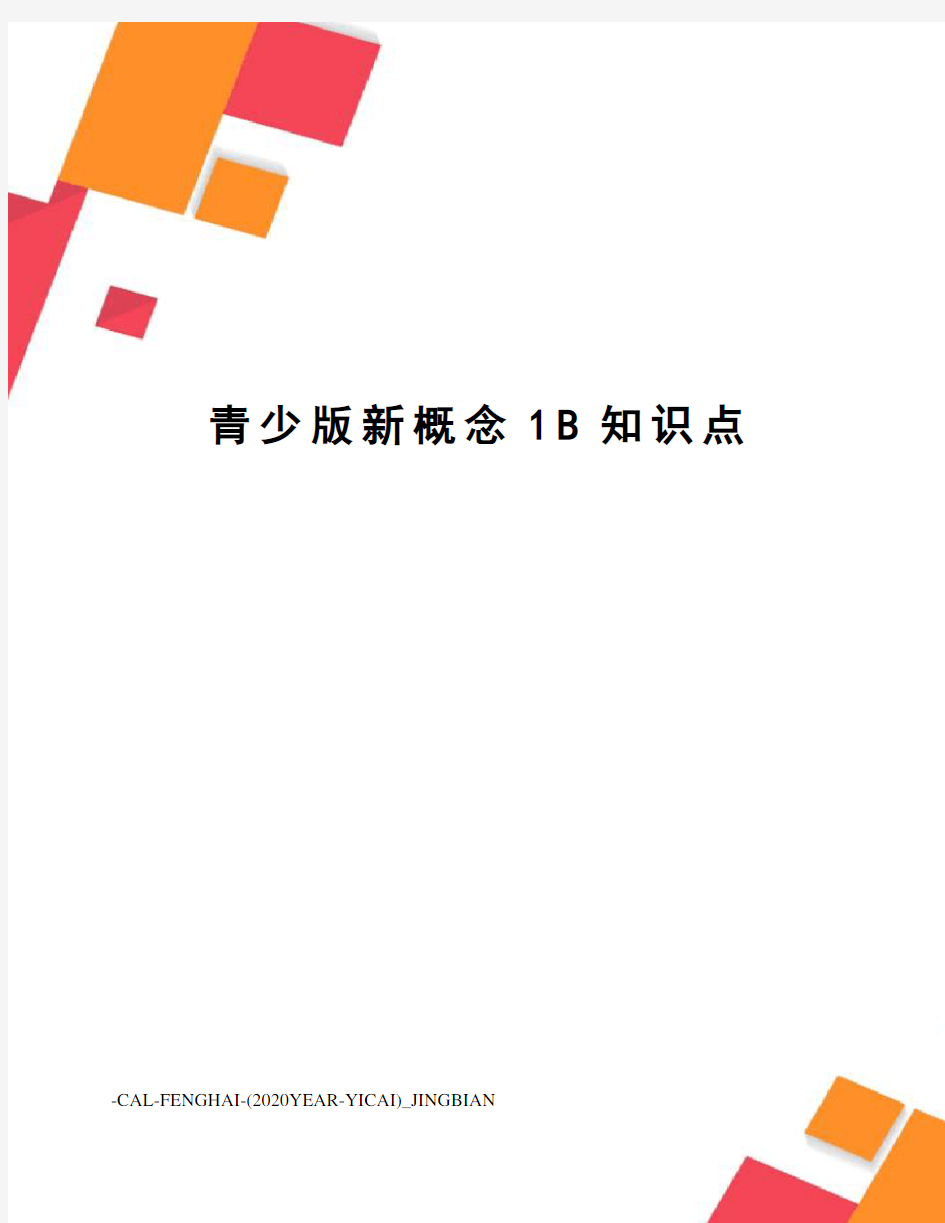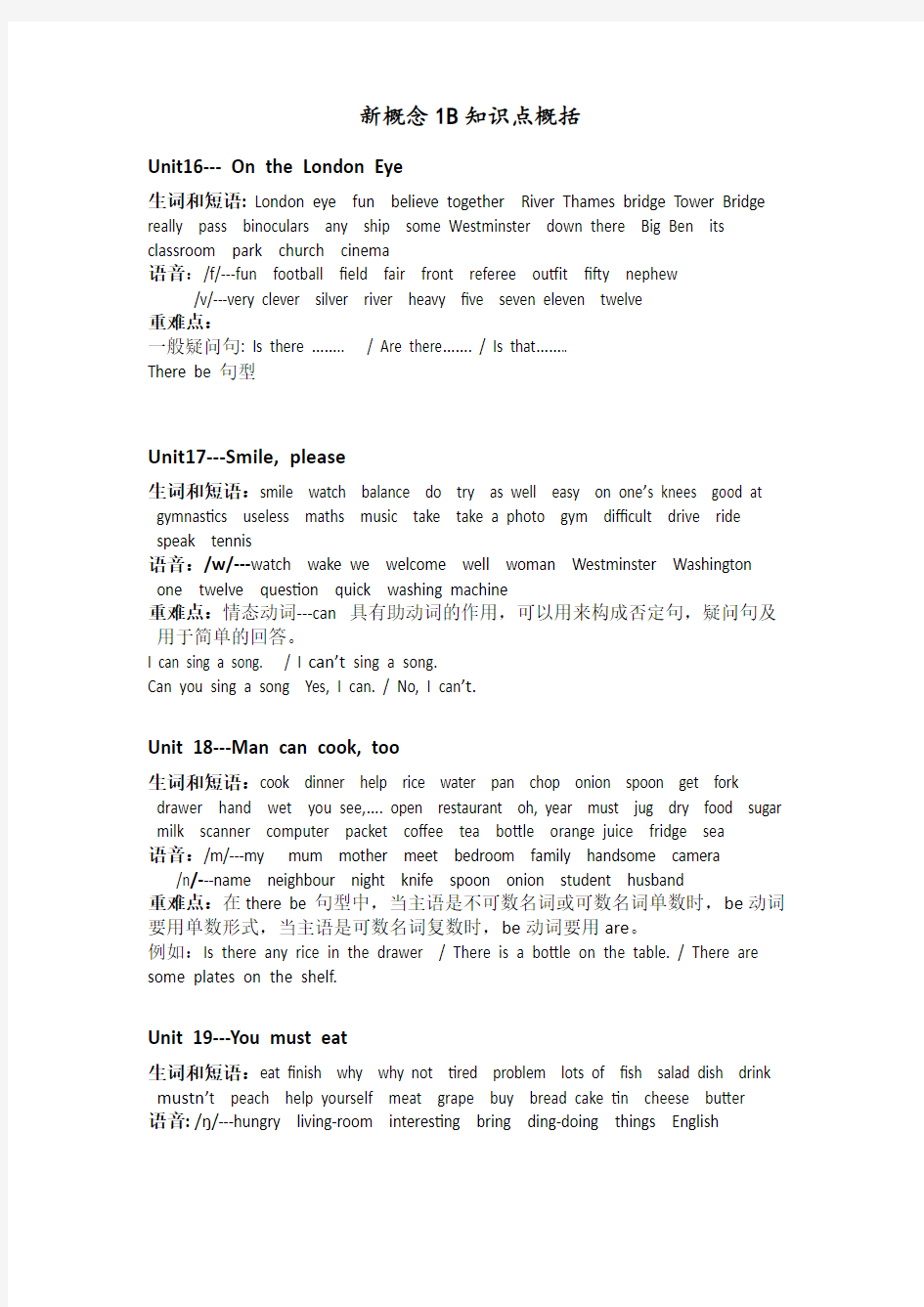

青少版新概念1B知识点-CAL-FENGHAI-(2020YEAR-YICAI)_JINGBIAN
新概念1B知识点概括
Unit16--- On the London Eye
生词和短语: London eye fun believe together River Thames bridge Tower Bridge really pass binoculars any ship some Westminster down there Big Ben its classroom park church cinema
语音:/f/---fun football field fair front referee outfit fifty nephew
/v/---very clever silver river heavy five seven eleven twelve
重难点:
一般疑问句: Is there …….. / Are there……. / Is that……..
There be 句型
Unit17---Smile, please
生词和短语:smile watch balance do try as well easy on one’s knees good at gymnastics useless maths music take take a photo gym difficult drive ride speak tennis
语音:/w/---watch wake we welcome well woman Westminster Washington one twelve question quick washing machine
重难点:情态动词---can 具有助动词的作用,可以用来构成否定句,疑问句及用于简单的回答。
I can sing a song. / I can’t sing a song.
Can you sing a song Yes, I can. / No, I can’t.
Unit 18---Man can cook, too
生词和短语:cook dinner help rice water pan chop onion spoon get fork drawer hand wet you see,…. open restaurant oh, year must jug dry food sugar milk scanner computer packet coffee tea bottle orange juice fridge sea
语音:/m/---my mum mother meet bedroom family handsome camera /n/---name neighbour night knife spoon onion student husband
重难点:在there be 句型中,当主语是不可数名词或可数名词单数时,be动词要用单数形式,当主语是可数名词复数时,be动词要用are。
例如:Is there any rice in the drawer / There is a bottle on the table. / There are some plates on the shelf.
Unit 19---You must eat
生词和短语:eat finish why why not tired problem lots of fish salad dish drink mustn’t peach help yourself meat grape buy bread cake tin cheese butter
语音:/?/---hungry living-room interesting bring ding-doing things English
重难点:情态动词must---must 跟can一样,不能在句子中独立做谓语,而必须跟其他动词原形一起构成谓语,并且也没有人称和数的变化。含must的肯定句变一般疑问句时要把must提到句首,其他部分不变。
例如:I must go now. / Must you go now 否定句是I mustn’t go now.
Unit 20---What a surprise
生词和短语:surprise lesson half past talk a quarter find bye when look for next homework wash then
语音: /l/---Linda Lucy look lesson lots apple milk bowl eleven o’clock
重难点:特殊疑问词---when,它针对时间提问,跟学过的what time一样,不同的是when比what time更广泛。What time 只针对钟点提问,而when还可以针对星期,月份,年份以及所有表示时间的短语提问。
例如:对句子My music lesson is 4:30.中的时间提问,既可以说When is your music lesson 也可以说What time is your music lesson 对句子You can call me tomorrow. 中的tomorrow 提问,就只能用When can I call you
Unit 21---Breakfast blues
生词和短语:breakfast blues do want not really something train stomach have got how much pot start morning yoghurt canteen much fruit chocolate beer paper string money spare good morning
语音: /? /---a an Karen student mother husband neighbour famous
/?:/---bird early girl thirteen thirty word shirt dirty
重难点:助动词—do do在句子中不能独立使用作谓语,并通常用于主语为第一人称,第二人称或第三人称复数的疑问句和否定句中。将肯定句变为疑问时,应将do放在主语的前面,变为否定句时则要在谓语动词前面加do not, 缩写为don’t.
Have got---I have got some coffee. 在这句肯定句中,have got表示有,肯定句变否定句时在have后面直接加not,缩写为haven’t,遍一般疑问句要把have提到主语的前面。要注意的是当主语是第一人称,第二人称或第三人称的复数时,才用have.
some和any---some用于肯定句,any用于否定句和疑问句中。
Unit 22---Watching the neighbours
生词和短语: a lot of shy many introduce to studies true always CD DVD jacket magazine video blouse skirt vegetable relative
语音:/?? /--- here dear hear near beer clear ear
重难点:have got----当主语是第三人称单数时,have应该变为has。肯定句中直接用has got,肯定变疑问时把has提到主语前面,而变否定时在has后加not,缩写为hasn’t. 口诀:你“有”我“有”大家“有”,have got最有用,他“有”她“有”它也“有”,就用has换have.
There be 句型和have/has got都表示“有”,但这两个“有”表达的含义不
同。There be 句型主要指“某处有某物”,表示存在与位置,而have/has got 主要指“某人拥有某物”,表示所属与拥有。
例如:我有一件夹克衫,应该说I have got a jacket. 床上有一件夹克,应该说There is a jacket on the bed.
Unit 23---An expensive camera
生词和短语: kind let me think Japanese remember I know lucky another like birthday at any time British German plastic leather CD player Italian watch Korean handbag clock Swiss very much
语音:/e?/---there Claire chair fair downstairs where careful
重难点:助动词---does does 是用在第三人称单数做主语的句子中,其他用法跟do 是一样的。当句子中出现does 和doesn’t 的时候,谓语动词要使用原形。Does 是do 的第三人称单数形式,
例如:Peter 想要啤酒,Peter wants some beer.而否定句是Peter doesn’t want any beer. 一般疑问句是Does Peter want any beer 特殊疑问句是What does Peter want
Unit 24---A light dinner
生词和短语: love salmon piece tonight potato lettuce cucumber fantastic pick strawberry dessert healthy meal worry cream first hate sweet wine
语音:/?? /--poor sure jury
/j??/--pure cure Europe
重难点:英语中,三餐和球类运动这些名词的前面是不加冠词的。
例如:have breakfast, have lunch, have dinner. Play basketball, play football.
Unit 25---The weekend shopping
生词和短语: weekend shopping supermarket make shopping list need loaf Sunday lunch Sunday boring ice cream nasty anything else bar soap large match girlfriend
语音:/i /-- twenty happy heavy family easy busy Lucy strawberry
/ju: /--beautiful music new nephew student stupid usual useless
重难点:可数名词与不可数名词---不可数名词的数量可以借助一些表示容器的名词来表达,如:two bags of sugar, four packets of tea. 还可以借助表示物品形状的名词来表达,如:a loaf of bread, a piece of paper.
可数名词除了可以直接用数字加名词复数表示数量外,也可以借助表示容器的名词和表示物品形状的名词来表达,如:a box of chocolate.
need---need作为实义动词,后面可以接名词或代词,
例如:I need a loaf of bread. / I don’t need it.
Unit 26---- A self-service restaurant
生词和短语:self-service menu assistant soup tomato sauce my dear lady glove already jeans newspaper
语音:/? /--- self shy shopping show washing-machine English
/? /--- usual unusual pleasure measure treasure television
重难点:动词show--- 它是可以带双宾语的及物动词(后面可直接接名词或代词作宾语的动词就是及物动词,而不及物动词与之相反,后面不能直接接宾语)。
show+某人+某物 / show+某物+to+某人
Show me your bag. / Show your bag to me.
Unit 27---- Toothache
生词和短语:toothache look awful dentist patient make an appointment emergency today this afternoon miserable feel hope earache day Monday Tuesday Wednesday Thursday Friday Saturday headache sick stomach-ache flu cold
语音:/t?/---chair cheese child children Chinese kitchen teacher watch /d?/---juice just gym jar pyjamas bridge language college
重难点:介词---at / on /in 与具体钟点连用的介词一般是at,而在某一天则是on.,如果时间范围继续扩大,如在一周,一个月,一年的时间里,就用in.
例如:You can call me at 4:00. I must go at two on Friday.
Unit 28---Every day is different
生词和短语:every different weather mean quite ever warm England summer sunny Atlantic climate often rain sometimes especially July cool difficulty change month temperature China spring sun shine cloudy season usually never autumn winter snow France Russia Africa windy same
语音:/r/---red round Robert referee Karen camera cream dry try spring bread breakfast orange drawing surprise
重难点:英语中通常用it 来代替天气,It is +表示天气的形容词+in+月份或季节等。
频度副词----指表示动作发生的次数的副词。我们将这些频度副词按动作发生的频率从低到高排列,是never从不,sometimes有时,often常常,usually通常,always总是。
频度副词在句子中的位置常常是在be动词,助动词,情态动词之后,实义动词之前,有时也放在句首或句尾以示强调。
Unit29---Many happy returns of the day
生词和短语:Many happy returns August year present bike gear traffic dangerous about safe date question ask special January February March last December after before April May June September October November parent
语音:/h/----hand happy have help horse hot how hurry husband who whose
重难点:序数词---表示顺序的数词叫序数词。第一:first 第二:second, 第三:third, 第五:fifth, 第八:eighth, 第九:ninth,第十二:twelfth, 这些为特殊形式,其他的序数词都是由相对应的基数词后面加th 构成。
在使用序数词时,前面通常要加冠词the.
Unit30---An international event
生词和短语:international event race mile runner world Australia complete European impressive rank marathon practice Moroccan Brazilian Canadian German Chinese name New York country Australian live Sydney language Brazil Sao Paulo Portuguese Germany Berlin Canada America
语音:/j/---yes you your young yoghurt yo-yo beyond William
重难点:be动词构成的一般现在时
be动词构成一般现在时态时,be动词的形式要随主语的变化而变化:
肯定句: I am…… You/We/They are……. He/She/It is ……..
否定句:I am not …… You/We/They are not (aren’t)…. He/She/It is not (isn’t)…..一般疑问句:Am I …. Are you /we/they…. Is he /she/it ….
特殊疑问句:特殊疑问词(组)+am + I ….
特殊疑问词(组)+are +you/we/they….
特殊疑问词(组)+is+ he/she/it….
实义动词构成的一般现在时
实义动词构成一般现在时态时,当主语是第三人称单数时,谓语动词也要用第三人称单数形式,而当其他人称代词作主语时,谓语动词要使用原形。
肯定句:I/we/you/they +动词原形+…..
He/she/it +动词第三人称单数形式+……
否定句:I/we/you/they +do not(don’t)+动词原形+…..
He/she/it+ does not(doesn’t) +动词原形+……
一般疑问句:Do I /we/you/they +动词原形+……
Does he/she/it+动词原形+…….
特殊疑问句:特殊疑问句(组)+do I /we/you/they +动词原形+…….
特殊疑问句(组)+does he/she/it +动词原形+……
国家及哪国人:Africa America Atlantic Australia Berlin Brazil Canada China England France Germany Italy New York Russia Sao Paulo Sydney
Australian Brazilian Canadian Chinese German Italian Korean Moroccan Portuguese
一些建筑: River Thames Tower Westminster
月份: January February March April May June July August September October November December
星期: Sunday Monday Tuesday Wednesday Thursday Friday Saturday
日常及用品: beer bike binoculars blouse bottle bread bridge butter cake CD player cheese chocolate coffee computer cream cucumber dessert drawer fish